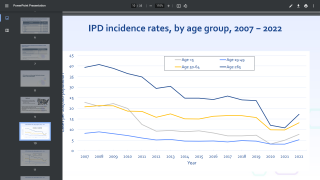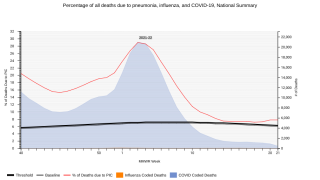15-valent Pneumococcal Conjugate Vaccine Reports Very Positive Phase 2 Results

A Phase 2 clinical trial evaluating the safety, tolerability, and immunogenicity of a 15-valent pneumococcal conjugate vaccine candidate V114 reported very positive results.
This is important news since it is estimated that about 900,000 Americans get pneumococcal pneumonia each year.
In this study, NCT02982972, V114 was reported by Merck to have met its primary endpoint by demonstrating noninferiority for the 13 serotypes.
Additionally, V114 also induced an immune response in infants for 2 additional disease-causing serotypes, 22F and 33F, which are not contained in PCV13.
This Phase 2 study V114-008, was a double-blind, randomized trial, comparing the safety, tolerability, and immunogenicity of 2 different clinical lots of V114, in approximately 1,050 healthy infants at 2, 4, 6 and 12-15 months of age.
In the study, the percentage of subjects who achieved the accepted threshold of an immune response (IgG≥0.35 mcg/mL) with either lot of V114 was non-inferior to the percentage seen with PCV13, for the 13 serotypes shared between the 2 vaccines.
For serotype 3, the percentage of subjects who achieved this threshold of the immune response was higher for V114 (96.0% for lot 1; 94.1% for lot 2) compared with PCV13 (71.8%).
For the 2 serotypes not included in PCV13, serotype 22F and serotype 33F, the percentage of subjects who achieved the defined threshold of immune response with V114 was above 98 percent and above 87 percent, respectively.
These results were consistent between the two lots of V114 studied, and the safety profiles were evaluated after each dose and throughout the study.
“Children under the age of 2 are at increased risk for pneumococcal infection, which in some cases may lead to serious illnesses like pneumococcal pneumonia,” said Dr. David Greenberg, study investigator, and physician in the Pediatric Infectious Disease Unit of Soroka University Medical Center in Beer-Sheva, Israel.
“These Phase 2 data evaluating V114 in infants are encouraging and mark important progress to helping expand protection against pneumococcal disease for this vulnerable patient population.”
Pneumococcal disease is an infection caused by bacteria called Streptococcus pneumoniae, and includes non-invasive illnesses such as pneumonia, sinusitis, and otitis media, and invasive illnesses such as bacteremia, bacteremic pneumonia, and meningitis, says the Centers for Disease Control and Prevention (CDC).
Currently, healthcare professionals use 2 different vaccines to prevent pneumococcal disease, says the CDC.
The pneumococcal conjugate vaccine (PCV13) is given to children in the first 2 years of life, to all adults 65 years or older, and to older children and younger adults with certain conditions that weaken their immune system.
Healthcare professionals give the pneumococcal polysaccharide vaccine (PPSV23) to adults 65 years or older, as well as children 2 years or older and younger adults with certain conditions that put them at increased risk.
Results of the V114-008 study were presented during an oral session at the 37th Annual Meeting of the European Society for Paediatric Infectious Diseases.
Merck has a broad clinical development program for V114 currently comprised of 11 Phase 3 clinical trials. These studies are investigating V114 in adults (NCT03480763, NCT03615482), in the pediatric population (NCT03692871, NCT03620162, NCT03885934, NCT03893448), and in immunocompromised persons and those at increased risk for invasive pneumococcal disease (NCT03547167, NCT03921424, NCT03731182, NCT03480802, NCT03565900).
Click here to learn more about Merck’s infectious diseases pipeline.
Our Trust Standards: Medical Advisory Committee


























